#jean-claude the executioner
Explore tagged Tumblr posts
Text
Joe Vaz who played Jean-Claude the Executioner in Good Omens Season 1 has passed away at the age of 52 :( ❤.

#good omens#joe vaz#jean-claude the executioner#3i7#ep3#french revolution scene#damn#tw death#rip joe vaz#gnu joe vaz
446 notes
·
View notes
Text

There is just no way in the universe that Aziraphale did a silly dance in apology for triggering Crowley's PTSD with the Jean-Claude the Executioner situation. I think it's likely that including 1793 in the list of when Aziraphale was the one apologizing tells us that The 'I Was Wrong' Dance either always was or very often was a verbal apology-- a verbal dance-- until S2.
In S2, Crowley then did a literal dance while also doing a verbal one because he knew that humorously incorporating two different meanings of the word Aziraphale had just said-- dance-- would amuse his equally wordplay-happy partner. I mean, these two who are later seen flirting over the different past tenses of the word smitten? Word dorks. 😊 It makes it easy to see how Crowley's sorry I fucked it up earlier and I love you in 2.01 was a tongue-in-cheek I shall dance you a visual pun in apology, my king.

Not only does Aziraphale not "owe" Crowley an apology dance, there seem to be some sleeping happening on the fact that Aziraphale's humorous and romantic response to Crowley's apology dance wordplay already exists.
Playing with the word dance during the week is how Aziraphale landed on the idea of the best way for him and his de facto partner to take the step of stopping hiding their relationship was to take some literal steps-- to dance-- in public together. 💘

#good omens#ineffable husbands#aziraphale#crowley#aziracrow#good omens meta#ineffable husbands speak
54 notes
·
View notes
Text
CORRECTED & UPDATED! Clothes + Equivocation = Romance:
The Husbands in 1793
EDIT: I made a significant error when I wrote this. As @goodjomans kindly points out in the comments to Part 2 of this essay (massive shoutout for this, goodjomans! also I love your name!), Aziraphale is the one who dresses the executioner in clothing like Aziraphale's original ensemble, not Crowley. This changes my conclusions about the meaning we can take from this scene!
On the one hand, mea culpa, y'all. I shall get on with eating my crow. On the other hand, I had to go through this frame-by-frame to catch which of the ineffable spouses puts Jean-Claude in his new togs, and the answer only lasts three frames. Here it is:
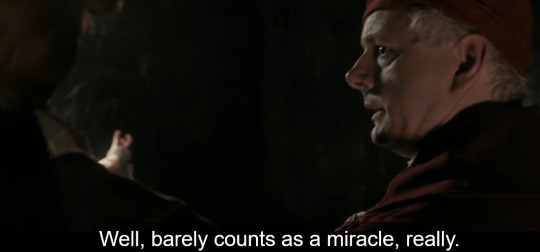
After Aziraphale changes his clothes, but before Crowley snaps his fingers and unfreezes time, there's a shot of the executioner over Crowley's shoulder, and he is now wearing a light coat with gold embroidery on the shoulders like Aziraphale's. Aziraphale arranges the executioner's death, not Crowley. So I feel like an idiot for missing it, but not a total idiot.
Let's discuss how this information changes what we can read from this scene! I'm going to leave my original text in place and edit with bold green. I can still stand by most of this essay, but this detail changes how I read the meaning of the husbands' communication at the end of this scene.
So we're all clear on the fact that the universe of Good Omens is an inescapable nightmare dystopia in which either of the husbands' merciless authoritarian regimes could be watching or listening to them at any time, yes? And that if either are caught 'fraternizing' with the other that means discorporation, torture, memory wipe, and/or death for either or both of them, yes?
Which means Crowley and Aziraphale can never speak or do anything openly to each other about their friendship or attraction or love. Everything they say and do has to have an innocuous meaning they can point to in case anybody ever sees or hears something Team Azcrow can't explain away. Walls (and ducks) have ears, and the price of slipping up--as we see in 1827--is heavy.
When a character says or does something that has two distinct meanings because they need to disguise what they really mean from one party but make their meaning plain to another, lit-nerds (and lit nerds🍃) call this equivocation. Equivocation is a kind of coded communication meant to pass hostile ears and eyes in plain sight but reach its intended recipient with its true meaning. The 1793 scene is jammed with it.
A lot of that coded messaging revolves around the clothes Crowley and Aziraphale choose in this scene, so--THESIS PARAGRAPH, BITCHES--we're going going to talk about how their clothes read to the people of this time period and location, what their clothes tell us about their characters, how their clothes help them equivocate, and what they're really saying with that equivocation. And Spoiler A-fucking-lert, it is ROMANTIC AF PRETTY GD ROMANTIC. Let's get nerdy!
We start with Aziraphale's beautiful champagne-gold and powder-pink ensemble.
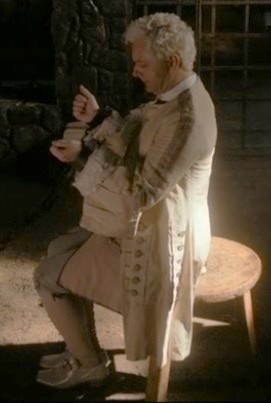
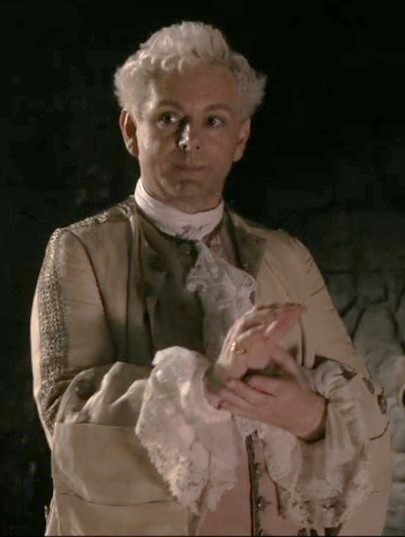
This outfit would tell people of this time period 3 things about Aziraphale:
That he's insanely wealthy--These clothes would be silk, hand-embroidered with thread made with actual gold. Each individual garment could cost years' or even decades' worth of working-class wages and take a team of skilled artisans dozens to hundreds of hours to make.
That he's a fop--i.e., a man who loves fine clothes and dressing up and looking fancy. By the 1790s in England, once-fashionable foppishness was giving way to the Neoclassical 'Corinthian' style, and was considered effete. (Fun note: During this time period, effete did not automatically indicate gay, and pink was considered a masculine color, so while Az. is queering it up to the audience here, his clothes would not have read as gay or overtly effeminate to the other characters around him.)
Even though he's insanely wealthy, Aziraphale wears clothes that are decades out of fashion.
According to the Victoria & Albert Museum, "As the [18th] century progressed, the male silhouette slowly changed.[...] Coat skirts gradually became less full and the front was cut in a curved line towards the back. Waistcoats became shorter. The upper leg began to show more and more[...]. Shoes became low-heeled with pointed toes and were fastened with a detachable buckle and straps or ribbon[.]
Source
That description is not what Aziraphale's wearing. Judging by his heel height and the length of his waistcoat, Aziraphale is wearing a style that's at least a decade older than this:
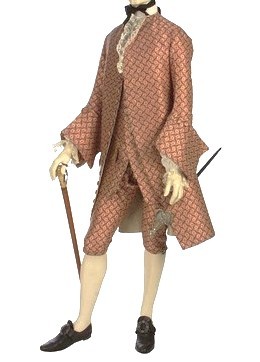
And this is from 1765. The great crepes caper happens in 1793, almost 30 years later.
My inference: Just as he has in the modern period, Aziraphale has settled into a style he really likes and refused to let go of it long after it's gone out of fashion.
We'll come back to this set of Aziraphale's clothes in a bit, but we need to talk about Crowley's first, because Crowley's clothes in this scene help render a line he says later about this outfit very flirtatious and darkly romantic.
First, some background: What was considered acceptable attire for wealthy people in France changed pretty much overnight during the French Revolution after the storming of the Bastille in 1789 and the fall of the French monarchy. Instead of advertising wealth, clothes now had to advertise political allegiance, and they had to do so loud and clear. And if you didn't want to be murdered by the French First Republic, that political allegiance had fucking better be to the Revolution.
People started wearing a looooooot of super patriotic shit. And I mean it was like little kids on the 4th of July; clothes were red, white, and blue in any hue and garish combination and print. The cockade, a fabric rosette in the colors of the French flag, was required by law to be worn by men, and despite that was just as popular among women. To show solidarity with the laboring classes, the fabrics the wealthy wore went from embroidered silk in light Rococo colors (what Aziraphale is wearing) to sober neutrals without decoration in wool, cotton, and linen.
Now, the script note for Crowley's clothing in this scene is this:

But clearly there were some changes made between script and filming, because Crowley does not appear standing behind Aziraphale; he appears lounging.
And he's not dressed as a French peasant.
Here's how French peasants dressed in 1790:
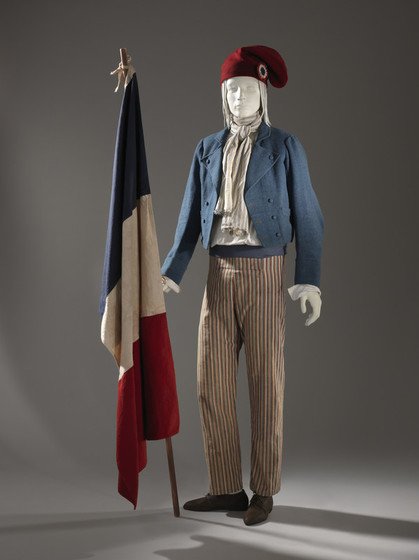
Peasants at this time wore styles that distinguished them from the styles of the upper classes not just in materials, colors, or patterns, but in shapes. Full trousers and cropped boxy jackets in French flag colors were the marks of the laboring-class Revolutionary, and both styles were huge changes from hundreds of years of French fashion up to that point.
And that's not what Crowley shows up wearing. Crowley is wearing the knee breeches, stockings, waistcoat, and frock coat of a wealthy man, and in fact his clothes reference a very specific type of wealthy man.
In the 1790s, if you were an aristocrat who wasn't happy about the Revolution and you were so sure of your privilege that you would risk your life showing it, you wore black in mourning for the monarchy and in protest of the violence of its deposition. If you were an aristocrat who wanted to protest and you didn't want to be immediately murdered by the French First Republic, you wore a style called half-mourning, which was black with a colored coat.
Here's a picture from a 1790 fashion magazine of an aristocrat in half-mourning:
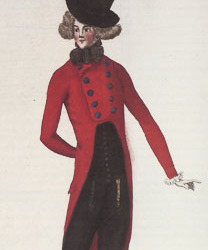
"The text accompanying the plate describes his ensemble as 'half-mourning,' referring to the aristocrats who lamented 'the diminished powers of the monarchy and [signaled] their willingness to die for the royal cause'" [emph. added]. [Source]
Notice: the shoes, stockings, breeches, waistcoat, and cravat are all black. You with me?
Because here's Crowley in 1793:
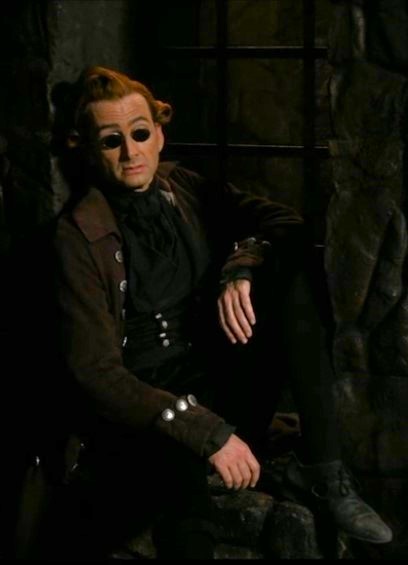
I've turned up the brightness and exposure in this image so he's more clearly visible against the stone, but I haven't warmed it up. He's wearing a coat that's a dark blackish red. Everything else, even his cravat, even his shirt, is black. (The black shirt is anachronistic, a lovely little nod to Crowley's refusal to wear angelic white.)
This is 179fuckin'3, y'all. Marie Antoinette is executed in 1793. It's 3 full years after that fashion plate up there in his bright red jacket, and that lil dude was already risking his neck way back in 1790. As we can see from the fact that the government are apparently now grabbing random wealthy-looking Englishmen off the street to murder without trial, the time for a man demon to be sauntering around Paris dressed in all black or even nearly all black is well past.
Crowley's also wearing a whole assload of huge silver buttons, which would have been flashy and tacky and frankly pretty weird in 1793 but very definitely an eccentric Rich Person Thing to do, bc regular buttons at this time were horn or wood and covered with the garment's fabric. The only man in France who could get away with this fancy aristo shit anymore was Robespierre himself, and only "devotion to the cause[...] excused Robespierre’s showy dress since he was perceived as a bridge between the politically empowered bourgeois deputies and the ardently antimonarchical unenfranchised classes." [Source]
So when Crowley teases Aziraphale--
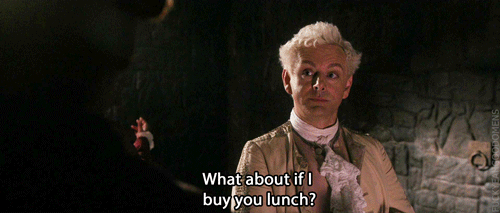
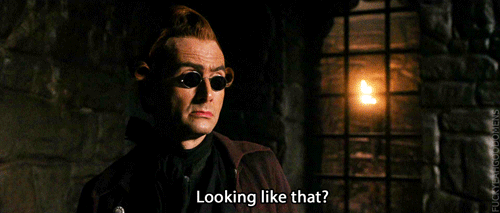
--both of them are perfectly well aware that Crowley's outfit would get him just as killed as Aziraphale's.
And that's why Aziraphale's expression is annoyed when he has abandon his "standards" and change his clothes. Because Aziraphale's the one who needs the favor, Crowley makes him take one for the team and wear the goofy hat.
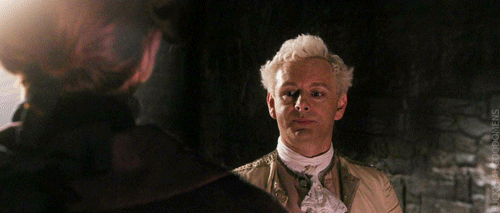
The clothes Az. changes into here still tell people that he's rich, but they also say he's a hardcore Revolutionary. The red jacket in a current cutaway style, the cockade and sash, and the bonnet phrygien (the red garden-gnome cap) all announce this guy is a huge supporter of the Revolution. His clothes are all still aristocratic in shape and materials (and he keeps his now-unfashionably frilly lace cravat), but he's no longer flaunting obscene wealth in a city filled with angry starving people, and the gnome cap says he's in solidarity with the working classes even if he isn't one of them.
Once he restarts time, Crowley is not leaving that prison cell safely without either changing his clothes or taking Aziraphale with him, because Crowley looks like a rich asshole protesting the fall of the monarchy--which is frankly exactly the kind of thing he'd show up wearing to the Bastille during the Reign of Terror (just like he wears athleisure in Heaven). But Aziraphale's new appearance covers for them both: if the rich-looking guy with no cockade and wearing all black under his almost-black coat is in with this other guy who's obviously a Revolution fanatic, then the rich guy's probably okay, right? He just forgot his sash at home or something. Bees.
Something else happens when Az. changes, too. Look at Aziraphale's new dress from a different angle:
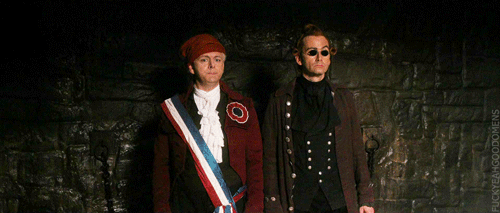
Half-mourning is a white shirt, but a black cravat, so this isn't half-mourning. He's wearing three different badges of the Revolution to make up for the fact that Crowley looks like a Satanic libertine (which tbf he is), but Aziraphale's new ensemble is black and dark red.
Y'all. Aziraphale changes into Crowley's colors.
Now, this is a more fashionable and higher quality version of what the executioner is wearing, so Aziraphale has very plausible deniability here; if anyone ever pulled him up on it, he could say he just copied our man Jean-Claude.
But let me show you what English fashion looks like right now:
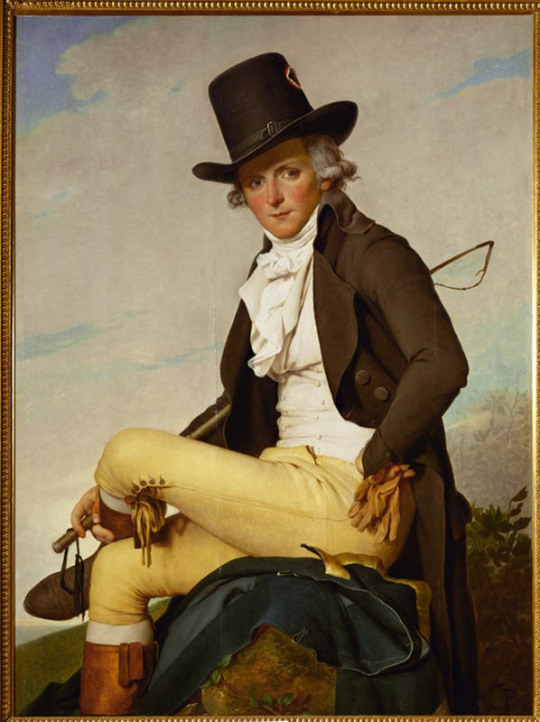
This is a French painting of a wealthy Frenchman, but he's wearing the English 'Corinthian' style. It was painted in 1795, so this would have been the very cutting edge of fashion in England in 1793, and the fabrics and colors look right at home in Revolutionary Paris. (He's wearing the cockade on his hat, btw.)
Look at all that angelic white! The buttery almond of the buckskin breeches, the golden kidskin gloves, the rich tan of the riding boots! The blue of the greatcoat! All colors we know Aziraphale prefers!
And yet this is what Aziraphale chooses:

We know from the entire rest of the show how very particular about his clothes Aziraphale is. And yet 150 years before he (accidentally) admits in words that he's Crowley's friend, Aziraphale wears Crowley's colors to take him to lunch to say thank you for a rescue.
When we decide whether a character's speech or action is equivocation, one of the things we check is whether equivocation (and deception generally) is something that character does elsewhere in the text, which, with Aziraphale, hahahahaha, DUH. He's already using equivocation in this scene.
The lunch date itself is equivocation on Aziraphale's part. Aziraphale tries to thank Crowley for the rescue, but Crowley says,
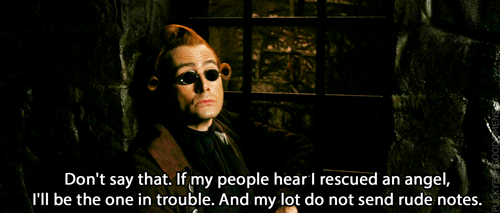
So Aziraphale says,

No more words like "thanks" or "rescue" used, but a couple hours of good food and drink and conversation, Aziraphale hopes, will express the gratitude toward Crowley it's not safe to speak aloud. With this, Crowley and Aziraphale explicitly establish that they are equivocating for each other's safety and using coded communication--immediately before Aziraphale changes into Crowley's colors.
So yes, Aziraphale may well copy the executioner's clothes. But consider: When a character who can't speak or act openly says or does something that has two or more possible meanings, this can be read as equivocation.
We don't get a face reaction from Crowley about Aziraphale's new 'fit, so we can't be sure how he feels about this. But this whole scene is, even on its surface, about 1) the meaning clothes transmit to a viewer ("Oh good Lord," says Aziraphale when he sees what Crowley's wearing) and 2) how to show gratitude and appreciation when you can't speak of them openly. And we know Crowley notices clothing and clothing colors, because look at what he wears, like, ever. So it's very reasonable to presume he notices Aziraphale wearing his colors, and it fits well with both the rest of Crowley's actions in this scene and with his being very hurt and angry when Aziraphale later characterizes their interactions as "fraternizing."
Right, so we've covered what's going on with the husbands' clothes, and we've looked at two examples of equivocation on Aziraphale's part, viz., lunch and his change of colors. (Here's an example of equivocation on Crowley's part as well.) Now let's look at that super interesting thing Crowley says about Aziraphale's first outfit.
Here's the line:
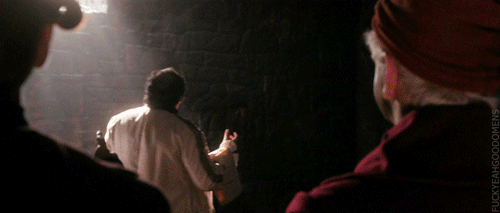
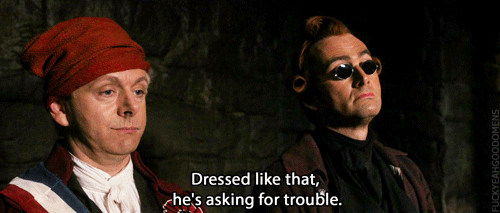
Crowley follows up here on earlier lines in which he teases Aziraphale for coming to Reign-of-Terror Paris for crepes: "Dressed like that?" meaning Aziraphale was guaranteed to get arrested dressed like an aristocrat. The top layer of equivocation is always an innocuous meaning: the plausible deniability meant for the hostile/unsafe listeners. That's Meaning 1.
But "Dressed like that, s/he's asking for trouble" means two other things, too. It's a veeerrrrry familiar phrase, isn't it? We've all heard that arrangement of words in that order before. It's used when people think someone (usually but not always a woman) is dressed to invite sexual attention.
How do we know we're supposed to take this modern meaning from this phrase? This is how:

We have learned in literally the previous sentence to this one that rain has not been invented yet. The only two humans in existence have just left the Garden. Balloons definitely do not exist yet, humans couldn't tell you what lead is, and yet this is a phrase Crowley uses and Aziraphale understands. This tells us, the audience, in the very first line of the very first scene with these characters, that their speech is anachronistic and modern, and that we are to understand their phrasing in its contemporary sense.
So. When Crowley says "Dressed like that, he was asking for trouble" in 1793, we should read that in the context of the scene and in the senses the phrase carries to us today.
And since Crowley is using a phrase that means the executioner is dressed to invite sexual attention, and the executioner is wearing clothes identical to Aziraphale's, then Crowley is necessarily telling Aziraphale that when Aziraphale was wearing those clothes--those frilly, effete, unfashionable-for-decades clothes that nobody else likes and the French now murder people for wearing--that was, in Crowley's view...provocatively sexy. Meaning 2.
"Dressed like that, s/he was asking for trouble" is also what people say to justify violence, especially sexual violence against women and queerphobic attacks against men perceived as gay or just 'insufficiently' 'masculine'. In fact justifying assault is likely the most common way this phrase is used today by a wide margin. Meaning 3.
Crowley's joke isn't even really a joke in this sense; it's a vicious barb. And, because it must, it sounds like it's at Aziraphale's expense: You wore the wrong clothes, you weren't careful enough to guard yourself against the men who want to do you harm, so you deserved the trouble you got. Meaning 1.
Except remember: Crowley is also dressed for trouble. And Aziraphale is aware of this. Crowley's 'fit would be almost as offensive to the Revolutionary French of 1793 as Aziraphale's Rococo pastels, and probably just as likely to get him arrested and murdered by the state if he weren't making letting Aziraphale keep him safe by wearing the cockade and the silly hat. Crowley's not saying anything about Aziraphale here that he's not also saying about himself; and as we know from Aziraphale's initial "Oh good Lord" when he turns around and sees Crowley's black and red half-mourning (with extra black and gobs of silver), Aziraphale knows it.
Then why the rapey joke, Crowley?
This is fucking why:
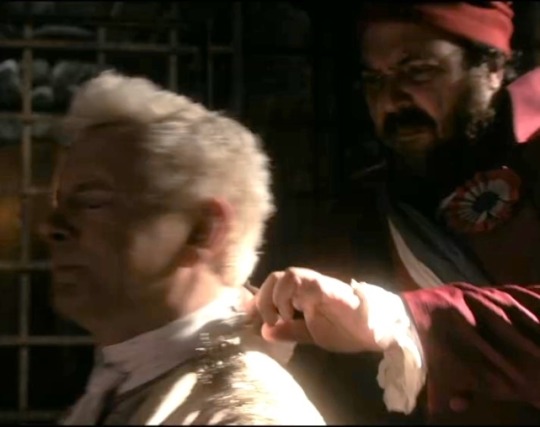
Crowley rocks up at the Bastille just in time to witness some grubby fucker assault his friend. Assault the person Crowley will greet 15 seconds after this as angel.
Crowley's first act after freeing Aziraphale is to send this dude to his death. Nope! Aziraphale is the one who arranges to have the executioner killed in the clothes he would have killed Aziraphale for wearing. He takes Jean-Claude's ability to speak (but not to make sounds, interestingly! Jean-Claude can still whimper, Jean-Claude can still cry!) so the executioner can't tell anyone about the 'mixup.' It's unclear which of them blocks the executioner's power of speech. The vicious joke about assault in Meaning 3 isn't at Aziraphale's expense at all. It's not You wore the wrong clothes, so you deserved the trouble you got. It's If this guy thinks you deserve trouble for wearing the wrong clothes, he can eat his own rules.
And that's the other piece of evidence that, along with Crowley's ensemble, shows us the audience and Aziraphale which meanings Crowley intends with his equivocation. Meaning 1 is cancelled out by Crowley's clothes. That leaves Meanings 2 and 3.
Crowley and Aziraphale share clothes as a common interest. They don't have the same style, but they're both aware of current fashions, and Heaven and Hell aren't. You can't tell me Hastur or Uriel would recognize the significance of Crowley saying "Dressed like that, he's asking for trouble" about someone else while wearing black stockings and cravat and waistcoat himself. And that means Anything the husbands communicate to each other through clothing choices goes undetected by their masters.
SO. With all this in mind, let's go through the 1793 scene again and look at what their clothes help them say without words.
Concluded in Part 2!
#good omens#good omens 2#good omens s2#good omens costumes#good omens fan theory#good omens meta#good omens analysis#aziracrow#azcrow#ineffable husbands#aziraphale x crowley#azicrow#good omens 1793#good omens 1984#good omens clothes and equivocation
584 notes
·
View notes
Text
Continuity Errors
Crowley can stop time. We’ve noticed buggy things about time. Let’s talk about it.
I’m going to start with an overview of every time he has definitely frozen time in order to establish the mechanics of Crowley’s time-stopping power in the GO universe. Then, I’m going to talk about other events where Crowley may have stopped time, and it wasn’t (directly) shown to the audience.
or read this 3,500 word beast of a meta on Ao3
edit: if you're deciding whether or not to read this, check out the reblog notes!
Opening obligatory "do not put anything about this in Neil Gaiman's askbox"
Crowley freezes time locally, selectively exempting individuals
S1E2
In S1E2, Crowley freezes time at the corporate training ground to interrogate Mary Hodges, formerly Sister Mary Loquacious (played by Nina Sosanya, actor for Nina in S2). It may seem like she’s just hypnotized and time is progressing normally around all of them, but that isn’t the case. Immediately before Crowley hypnotizes Hodges, we can hear gunfire in the background; a few seconds before Hodges is released from the trance, we hear shouting and sirens. But during the time that Hodges is entranced, all we hear is three things: the dialogue, music, and what sounds like the ticking of a kitchen timer.
We could do a little bit of extrapolation from the fact that the beginnings of gunshots and siren sounds are temporally very close together, especially depending on how we measure time. Crowley turns the paintball guns into deadly weapons at 36:59. Crowley freezes Mary Hodges at 38:47. A ticking sound starts the same moment. We also hear what we will come to recognize as the “pause time” sound, a sort of wobbly sound. The ticking sound seems to stop around… 40:07? Right before the line about lovely little toesy woesies? It’s unclear with the overlapping tracks. At 40:11 Crowley says “let’s go” and we can hear sirens in the background start now. Aziraphale then snaps his fingers and unfreezes Hodges at 40:17.
So during 191 seconds of screentime, 84 seconds of it was spent with time frozen, if I accept the ticking sound to be the indicator. If time was only frozen locally, meaning just the paintball grounds and not the nearest police station and roads leading to it, then emergency services had just over three minutes from the time the first live round was fired to arrival. If time was actually frozen globally except for Crowley, Azirarphale, and Hodges, then emergency services got there in 85 seconds, or less than a minute and a half. Maybe Britain is doing something wildly different than here idk but I think the more likely explanation for the event timing is that Crowley is only freezing time in a local bubble. The shooters stop shooting but the police are still driving towards them while Crowley and Aziraphale are interrogating an entranced Mary Hodges.
The case with Hodges is kind of confusing because the audience is presented with a false dichotomy between “frozen in time” and “hypnotized.” It’s actually both. Crowley has frozen time around the three of them, but Hodges, like Aziraphale, was exempt. It just so happens that she was also entranced at the same time, which explains as well why Aziraphale can release her from the trance, since our best evidence indicates that he can’t control time.
S1E3 & S2E3
In S1E3, Crowley freezes Jean Claude, the executioner at the Bastille. Immediately before, we can hear the guillotine, screaming and jeering outside the cell. As soon as Jean Claude is frozen, however (13:29, complete with wobble sound), there is complete background silence, except for the dialogue between our ineffable aristocrats. When Crowley restarts time, background noise restarts as well. This evidence indicates that Crowley froze time for the surrounding area as well as inside the cell.
In S2E3, Crowley freezes Mr. Dalrymple. We don’t have definitive information about how much of the rest of the world is affected since the scene takes place indoors on a quiet night and there are no external cues of time starting or stopping.
S1E6: Freezing Out Satan
In S1E6, not only are Crowley, Aziraphale, and Adam pulled out of the normal flow of time: it seems that they are also pulled out of normal space. They appear to be in an ethereal desert where we can see their wings, but we don’t actually know where they are. The way we enter, inhabit, and then exit this time-stop is completely different from any of the other three explicit timestop scenes: Crowley must use his whole body to summon the power to cast the miracle, they travel elsewhere, then he must use his crankshaft to exit the time-stop.
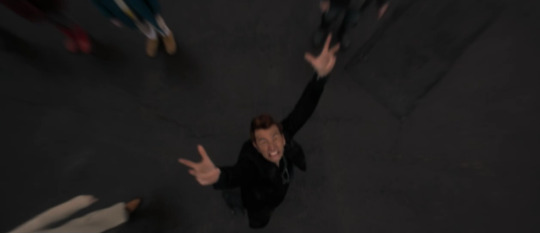
I take this to indicate that freezing time when Satan is near takes a lot more power than freezing time around Mary Hodges, Jean Claude, or Mr. Dalrymple. Presumably, the power a being has, the more power it takes to lock them out of a bubble to stopped time.
Time Stop Mechanics
Here are my key takeaways from analyzing these four scenes:
Crowley isn’t so much freezing all of time as pulling himself and Aziraphale (and sometimes Adam) out of the flow of time. The effort this takes is dependent on the entities that they are “pulling away” from. It is easy to pull away from humans, so much so that they don’t have to pull away very far and can occupy the same space in a bubble of paused time. When he is “pulling away” from Satan, however, he must pull away much further, all the way to another plane.
Crowley’s ability is so powerful that he can use it to escape Satan. He could use it to lock out other powerful beings, if he wanted to, but it would take a lot of effort.
Aziraphale, a being with power somewhere on the spectrum between human and Satan, could be frozen by Crowley’s powers. The fact that Aziraphale is still present and active during all of these scenes, unaffected by the time stop is only indicative of Crowley’s choice to exempt him, just as he does with a hypnotized Mary Hodges and Adam.
Crowley has stopped time on Aziraphale
In a previous post I have addressed the possible symbolic meaning behind the Honolulu Roast sign that suddenly appears behind Crowley in the S2E1 coffee shop scene. This addresses the symbolic meaning of Honolulu with respect to Aziraphale, but fails to address the “roast” part, which I have the opportunity to do now. I begin by establishing two premises:
Crowley loves Aziraphale and after 6,000 years knows him very well.
Crowley is a dick.
Crowley sits down at the table across from Aziraphale and asks him what the problem is. At this point, there is no “Honolulu Roast” sign behind him. The camera flips to Aziraphale as he (badly) tries to deny that there is any problem. When the camera flips back to Crowley, a “today’s special: Honolulu Roast” sign has appeared behind him.
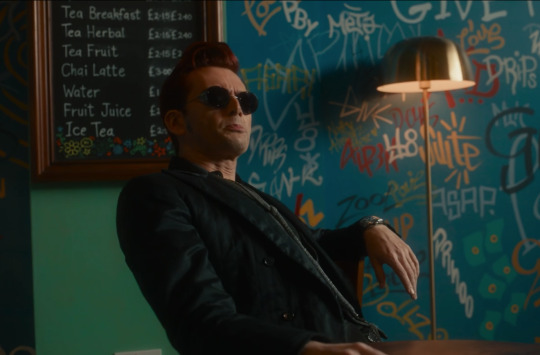
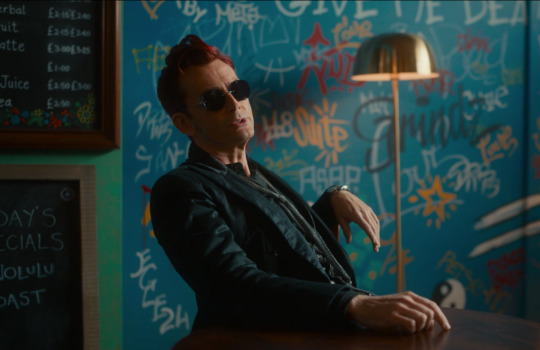
What does Crowley do next?
Crowley roasts Aziraphale.
Crowley proceeds to read Aziraphale to filth, rattling off all his tells and putting him in his place for even daring to think that he could mislead Crowley about his internal emotional state.
While we’ve seen a lot more of his soft side this season, we cannot forget that the demon Crowley, at the end of the day, is a prick. He really did pause time just so that he could go get a chalkboard, write a pun on it, and hang it on the wall behind him like a display card for open mic night. He’s still going to help Aziraphale, of course. But he’s going to make fun of him first.
Let me reiterate: Crowley literally paused time, got up from the table, put up this sign, then sat back down in (as close to) exactly the same position (as possible) to fool Aziraphale into not noticing the pause, because this joke is entirely for Crowley’s own amusement. We have some cinematographic evidence of this besides just the sign itself: the lamp behind him has moved slightly, and the camera angle focusing on Crowley has changed. Literally, the left hand side of the frame gets cut off due to the repositioning. From a production perspective, this scene would have been shot all at the same time, so should not have changed angles. That said, they did a by-hand follow-in of Crowley walking in and sitting down, then switched to a dolly, but… I have faith that they could have matched the shot line-up practically pixel for pixel if they wanted to. All to say: changing the camera position before and after, alongside the other conspicuous changes, seems like it was a deliberate framing choice used to indicate that Crowley tried his best to get back into exactly the same position, but was just a little off.
But Crowley’s prank is troubling from a perspective of honesty and agency. Based on the way the dialogue progresses, it seems pretty clear that Aziraphale doesn’t know that he was frozen. Whether or not Crowley could freeze Aziraphale was beside the point until this scene where we learn that Crowley would, even for a really dumb reason like making a joke at Aziraphale’s expense.
Before moving on, I want to note that the sudden appearance of this sign could be characterized as a continuity error, even though it was the result of a deliberate action by an in-world character. Jettison your traditional understanding of “continuity error” as “production made a mistake.” In this universe, we can have continuity errors by virtue that Aziraphale is experiencing time as if it is continuous, not noticing that he functionally blacked out for a few minutes and that things have changed around him. This is not a show-level continuity error. This is an Aziraphale-level continuity error.
Crowley can reverse time
Credit where credit is due: it was this comment on the Ao3 version of my meta, The Erasure of Human!Metatron, that became an earworm that got me thinking specifically about Crowley's abilities:

So thank you, LoveIsLove <3
Let’s go back to the Mary Hodges scene, or actually a few minutes before. Our ineffable idiots get shot by paintballs.
“Look at the state of this coat. I've kept this in tip-top condition for over 180 years now. I'll never get this stain out.”
“You could miracle it away.”
“Hmm… Yes, but… well, I would always know the stain was there. Underneath, I mean.”
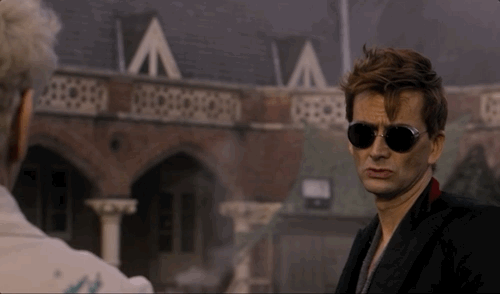
Aziraphale finagles himself a favor without ever actually asking for it. Full points, princess. But let’s examine the actual content of the dialogue. This cannot be a complete 100% bluff; Aziraphale is not going to tell a straight lie to Crowley that they both know is false about the respective nature of their powers. It must be the case that there is some truth to this statement. There is a fundamental difference between what Aziraphale can do about the paintball stain and what Crowley is actually going to do about it. Furthermore, what Crowley does is something different than a miracle.
Crowley then blows on the stain, it disappears, and Aziraphale looks quite pleased. Yes, yes, he cajoled Anthony J Acts of Service Crowley into doing his signature move, but also, he’s genuinely thankful that Crowley did something for him that he couldn’t do for himself, because miracles don’t work like that. Notably, Crowley doesn't snap his fingers or make any other gesture that we normally associate with miracles, and we don’t hear the miracle sound, which is further evidence that this is not a miracle, but something different.
If you haven’t already, please read my meta entitled Jimbriel, Satan, the Book of Life, and what it means for Crowley. It explains in depth and with evidentiary support my theory about how erasure works in the Good Omens universe. The Cliff’s notes version is that erasing something, whether it be a name from the Book of Life or a paintball from a coat, is akin to erasing a pencil mark on paper; it’s technically gone but you’ll always know it was there. Underneath.
What Crowley has done, then, is not erasing the paintball stain.
He’s reversed it.
When he blows on the paintball stain, he is reversing time in a microcosm of the universe, truly making it so that the paintball never hit the jacket. In a world full of rubber erasers, Crowley has the only Control-Z. When things are “erased” by the Book of Life, they are changed, but when Crowley reverses something, they never happened (making Beelzebub’s description of the Book of Life actually a more accurate description of Crowley’s power). It is something unique that Crowley can do that Aziraphale can’t, and we haven’t seen any evidence of any other celestial being pausing or reversing time. Please feel free to reblog with links to relevant meta if I’m wrong about that.
In true Neil Gaiman style, Crowley using this power to do something mundane like get rid of paintball paint was an incredibly benign and subtle way to indicate that Crowley has an immense, untapped power that we have not yet seen him use for any major purpose.
I repeat: we didn’t see him use it. Because usually, like Aziraphale, we the audience are exempt from the time freeze, and we get to watch what happens. But this time, we were frozen out with Aziraphale.
Clock Theory revisited: a reinterpretation of “continuity error”
A summary of clock theory
Neil Gaiman’s ask and answer on clock theory
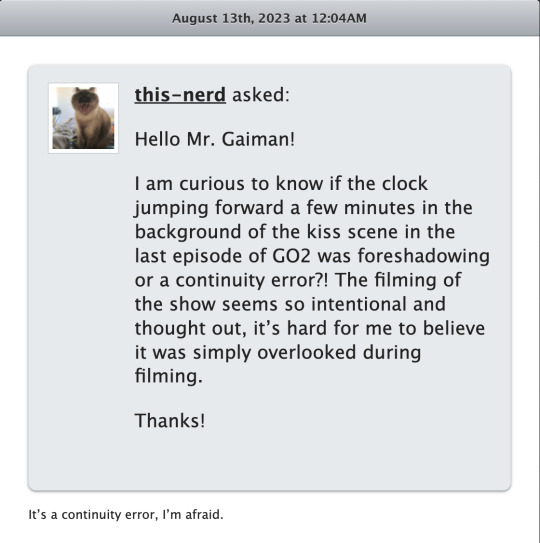
Neil Gaiman responded to an ask about the clock jumping forward from 9:25 to 9:40 before and after the kiss with a single sentence: “It’s a continuity error, I’m afraid.”
In the usual manner, Neil is not lying, but he is relying on you making an incorrect interpretation of his seemingly straightforward and innocuous but actually ambiguous and incredibly meaningful statement. As I stated with regards to the Honolulu Roast chalkboard sign, do not interpret “continuity error” as “production made a mistake.” Interpret “continuity error” as “Aziraphale believes that his experience of time is in lockstep with the actual flow of time and doesn’t realize that 11 minutes passed while he was frozen.”
Let’s consider the evidence:
Image at timestamp 41:04 “[Hold that thought!]” the clock reads 9:25

Image at 45:04 “If Gabriel and Beelzebub can go off together, then we can” the clock still reads 9:25

Image at 47:56 the clock now reads 9:40.

Image at 48:14 the clock reads 9:40
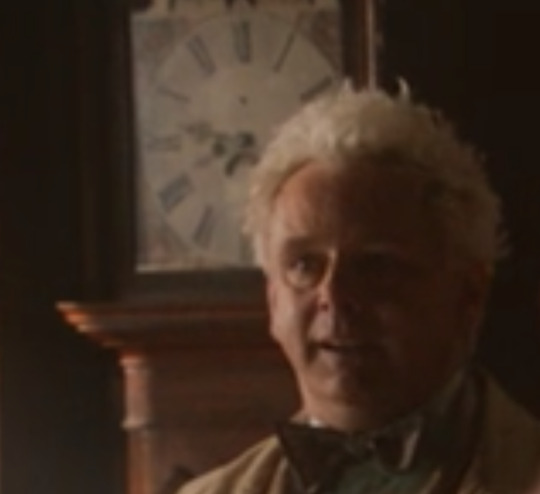
There are two four-minute gaps, from the perspective of the viewer, and we have views of the clock face at both ends of each gap.
Gap 1, from 41:04 to 45:04, the clock hands do not move at all, nor do they in any of the intervening shots.
Gap 2, from 45:04 to 47:56 (or 48:14, as you prefer), the clock hands move 15 minutes.
The Occam’s razor, Doylian explanation for why the clock hands don't move from 41:04 to 45:04 is that the clock is a prop. It does not have any timekeeping mechanism, the hands don’t move unless some human being opens up the glass, reaches in there, and manually adjusts it. They weren’t going to interrupt filming this moving scene to move the clock hands minute by minute, so it seems pretty plausible that the fact that it doesn’t move is just an artifact of production limitations.
The Watsonian explanation, which I do not favor, is that Crowley has frozen time for just the two of them. They are in a microcosm all their own. If true, this would have an abundance of implications, such that they are actually free to speak to each other freely, which they don’t. So I feel like with that alone, we can set this aside, but I’m open to being convinced otherwise.
If we accept the “clock is a prop” explanation for Gap 1, it doesn’t really hold for Gap 2 that they moved it a full fifteen minutes. So much care and attention to detail was given for all other parts of this show; I don’t realistically believe that a production staff member moved the hands a random amount. The music carries us from Crowley’s exit to Metatron’s entrance seamlessly, yet more time seems to have passed in-world than on-screen. There are two possible explanations:
There was more material that was supposed to be filmed to account for 15 minutes that got cut
We are supposed to figure out that there’s some “Greek play” style shenaniganery afoot
I will debunk explanation #1 with simply this: David’s contact lenses would sometimes rotate so that the slit pupils were not vertical. This error was fixed by VFX in post.
You might assume, when watching Good Omens, that Crowley’s serpent-like eyes are created using contact lenses. Or perhaps you’d presume they’re CGI. Actually, they’re a mix of both.
“The CGI versions were usually because the contact lenses had swiveled in David’s eyes … and we had to fix it,” says Mackinnon.
If they could fix Crowley’s eyes in post, there is absolutely no reason to expect that they couldn’t or wouldn’t have fixed the clock hand positions in post, especially if it was someone’s job to reach in there and change the positions to try to maintain set continuity in the first place. Additionally, there is deliberate use of clocks to symbolize various themes across both seasons. A Doylian error like this is not something that would have been overlooked and survived into publication.
So we are left with explanation #2. Time has passed that we, the viewers, don’t observe. What was happening during that time that we missed? More importantly, who knows that this time has passed? Aziraphale doesn’t seem to, and it’s unclear what the Metatron does or doesn’t know.
Some fans have posited that the Metatron is doing the time manipulations, but canonically, the only entity we have observed manipulate time is Crowley. We assume the Metatron is powerful because the angels are all afraid of him, but we’ve never actually seen him do anything, and so have no primary evidence for this. All over, he’s got some big “pay no attention to the man behind the curtain” Wizard of Oz vibes happening; I’m not convinced he could miracle his way out of a wet paper bag, and there’s a chance that in Season 3 we’ll find out that he’s all bluff. Not so with Crowley.
My hypothesis is that Crowley froze Aziraphale and everybody else for a one block radius, including the Metatron, and did something important in the bookshop before it lost its protection. Please see my meta on Sovereignty, Citizenship, and the Bookshop for an evidence-based argument on why the bookshop was the only place in the universe that Crowley could have safely hidden something. Since Aziraphale is no longer the head of an independent embassy, whatever Crowley was keeping safe in there isn’t safe anymore, and needs to be moved. Universe time continued to pass and the clock reflects that, but Aziraphale and the Metatron aren’t aware that they were paused.
Which also gives us a new interpretation for the kiss.
The Kiss, revisited
Crowley didn’t want to send Aziraphale a message.
Crowley needed a plausible cover for the immense effort it was going to take him to freeze time against Aziraphale and the Metatron that he knew was standing outside.
How do I know he knew?
No nightingales.
Juliet. Wilt thou be gone? it is not yet near day:
It was the nightingale, and not the lark,
That pierced the fearful hollow of thine ear;
Nightly she sings on yon pomegranate-tree:
Believe me, love, it was the nightingale.
Romeo. It was the lark, the herald of the morn,
No nightingale: look, love, what envious streaks
Do lace the severing clouds in yonder east:
Night's candles are burnt out, and jocund day
Stands tiptoe on the misty mountain tops.
I must be gone and live, or stay and die.
No nightingales could be the end of a romance. I argued as much in my inaugural meta just six weeks ago (and what a six weeks it has been, people!) But “no nightingales” could also be a secret signal to two people who have a unique bond through Shakespeare that Crowley has realized he is not safe, and he needs to leave, and he’s trying to tell Aziraphale that without letting their spectator in on the message.
Now he has to stop time to secure whatever item he’d been keeping safe in the bookshop. But keeping Satan at bay required him to lunge upwards, using his whole body to freeze time. He can’t get away with anything like that here in the bookshop, that would give up the ruse.
But what if he lunged at the person everyone knows he’s in love with and violently kisses them on the mouth, his entire body tense with the effort of freezing time in the presence of two ethereal beings? No one would notice the difference, or think anything nefarious of it; a Class A surreptitious time-stop.
One last crackpot theory.
Aziraphale knows what Crowley did. Well, he knows that he froze time, and for the first time realizes that Crowley has locked him out, and that he used the kiss as a cover. The violation of agency, trust, and their romantic bond are all breaking across him in the instant that time restarts, after Crowley has gone away for 11 minutes and returned to almost, but not quite, the same position inside Aziraphale’s arms. It is an intimate act that Aziraphale is fully tuned into, and for the first time, he’s noticing the continuity errors.
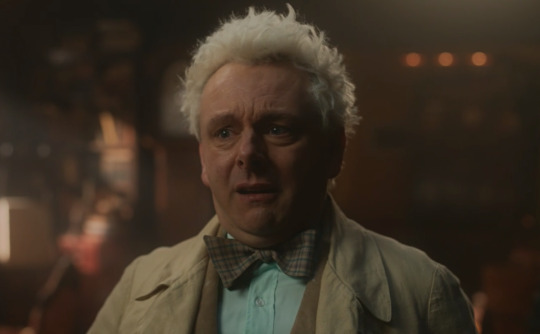
His horror-filled expression is one of broken trust. But his bond to Crowley is too strong for even this to break it. He knows that whatever reason Crowley had to pull this trick on him, it must have been a good one. It must have been to protect him.
“I forgive you.”
***
One more completely crackpot theory based on the Gavin Finney interview at The Ineffable Con last weekend.
The camera was supposed to circle them. Finney says that this was to show that they are the center of their universe, and their world is spinning.
Okay, okay. But could it not also have represented the spinning of clock hands? I’m just saying.
Closing obligatory "do not put anything about this in Neil Gaiman's askbox"
Find my entire collection of metas here
#good omens#good omens 2#good omens meta#the final fifteen#crowley#aziraphale#ineffable husbands#neil gaiman#metatron#fuck metatron#clock theory#erasure theory#ivoc#book of life#good omens theory#good omens s3 speculation#the metatron#fuck the metatron#you guys have no idea how happy it makes me that people are actually reading this#I know it's a lot but thanks for sticking through to the end
549 notes
·
View notes
Note
Hi! Have you ever read Susanne Alleyn’s “The Executioner’s Heir?” If so, what’re your thoughts?! :D
So, I was never able to read it in full, but from what I could read. Sorry if I didn't respond earlier, I am at an anime con.
Charles-Henri being the closest to Claude as opposed to his other sibblings is realistic. Her being worldly...Yes, some executioners did attend formal events with family, but, it was in Rouen and a few decades later. And it didn't end well. In 1753, Jean-Baptiste would be better off just beating her black and green himself. The result would be the same, just he would have saved money on the ticket.
Jean-Baptiste as a family man, I like that. Like, most his kids reached adulthood, and him treating them well is more probable than winning the lottery 10 times in the row.
So, according to Pascal Bastien, Jean-Baptiste did jail time for illegally applying a retumtum and was known as a charity medic according to other historians on the Sanson. I reconstructed in 2D the Sanson house and located it...Their neighbour was the comte de Charolais, known as one of the most sadistic individuals of his time. One of his most famous prank was shoving a petard up the sex of a widow and lighting it. Plus he had a many apprentices (Trevor Rhodes) which, if the litterature on torture is anything to go with, was not conducive to a healthy environment to put it nicely. Historiography of urban French urban history and mentality consistently show that women and girls of I'll repute were particularly sexually vulnerable. Wives of executioners had to deal with being looked down for doing what most prostitutes refused : marry an executioner. So, in 1754, it's no wonder Jean-Baptiste had a stroke, especially that his daughter was becoming nubile. Jean-Baptiste was also executioner during the May 1750 riots (La Marche Rouge). That is not speaking that the current questionnaire was Jean-Baptiste Barré, his stepfather. In all likelyhood, he was abusive to Anne-Marthe based on the clues in the "Dictionnaire historique et anecdotique des bourreaux". And yeah, the two worked together. No wonder this man had a stroke in at 34/35.
Anne-Marthe is on point, although...We lack her more intrigant side.
I find 14 year old Charles to be a bit too fluffy, at least for me. His 18 year old version is the amount of spice I want. Like, he spent one to four years with a fake identity. (I talked to my professor about his calligraphy, and he was most likely Jesuit educated). According to himself, he became his father's assistant at age 12. He must have pretty traumatized. (Yeah, public executions were the norm, but seeing one's own parent do it does not have the same impact). He worked many years as an executioner barely more competent than Jack Ketch during politically troubled times and lived to his sixties.
Overall, I loved the warmth and affection.
7 notes
·
View notes
Text
S1E3 – Hard Times Write Up P3 - Paris (1793) and St. James’s Park (1862)

Alright, first thing’s first for this scene. For those of you that haven’t seen the script, the translation of the executioner’s entrance speech is as follows:
Ah, the music of the blade, and the joy of the people. Beautiful, no? Now, let us inspect your neck.
Alas, nothing of hidden meaning there. Something I did pick up on when I was watching this scene back is that just after the executioner’s (Jean-Claude) entrance, an execution takes place offscreen. It’s talked about, and we are informed that the victim here was female. In what seems to be a really dark bit of humour here, it actually sounds like this is a botched execution. The audio for this scene is below - you’ll need to listen carefully as the script continues over the background soundtrack, but to me it sounds like we hear the falling of the blade, followed by a female scream that does not stop when we hear the thump of the guillotine hitting its target.
Jean-Claude even laments over the poor work that the executioner does, and that Aziraphale is lucky that he will not be executed by the inexperienced knave. I have a pretty dark sense of humour, but even I feel like I would rather believe the screams we can hear are of a spectator, perhaps a loved one of the condemned, distressed at the scene. *shudder*
Moving on to something a bit lighter, we have a reminder of the noise we should be associating with Crowley’s time freeze miracles – that little wobble board noise played over the miracle whoosh (not to mention the underlying tingly sort of noise that can be heard throughout the scene as the time freeze stays in place). Just why Aziraphale doesn’t realise that Jean-Claude has frozen until Crowley actually speaks is a mystery to me. Too caught up in his own impending administrative perils perhaps. What is less mysterious is how the angel feels about Crowley’s unannounced arrival in his cell.

There’s no denying that Aziraphale is delighted that Crowley has appeared – that little smile is pure reflex and he all but breathes his name. I’m sure some people will read it as relief as his friend showing up just when he needs help, but I am not one of them. The painfully obvious once over that he gives Crowley tells us everything we need to know about Aziraphale’s true feelings here. And then there’s that “good Lord” line – it’s not the only time we hear somebody refer to Crowley in this way. It’s an interesting choice of words for sure and if it wasn’t for the way that the angel is drooling looking at Crowley, who I should point out hasn’t exactly positioned himself in what one might call a demure pose, I’d say that he was trying to sound disdainful.
We’re treated to the first (chronologically speaking) mention of the book shop in this scene. There are a couple of other sources that fill in some gaps for us on this front – Neil himself confirmed that Aziraphale bought the land for the shop in the 1630s and the Script Book contains a deleted scene that shows the book shop would be opened in 1800. Seeing as it’s a feature of the series that will become so integral, it’s nice that we’re given a bit of its backstory.
We’re also given a bit of insight to Aziraphale’s insatiable appetite for human food in this scene. Whilst we as the audience have already been given some context around this, it’s only now we see just how strong his attachment to food is. After all, he abandoned his book shop opening plans and travelled to Paris at the height of a revolution that targeted the aristocracy whilst dressed head-to-toe in finery just to get some crepes. Crowley’s expression of disbelief when he finds out that this foolish errand has been driven by pastry-lust feels as though it embodies the thought process of everyone bearing witness to this conversation:

Aziraphale doesn’t appear to think his actions are out of order though. What’s interesting is that his attention is engaged not by the dressing-down he’s receiving, but by Crowley’s use of a particular phrase:

There’s an incredibly subtle eyebrow raise at Crowley’s use of the word “nibble” – it comes a split second before he talks about Aziraphale’s choice of clothing. It’s a real blink-and-you’ll-miss-it moment, so I cut it and slowed it down a little to demonstrate:

As if the angel hadn’t given enough of a clue about how he’s feeling about Crowley’s presence. Honestly, he needs to tell his face to stop giving away his heart’s desires so obviously. Though I’m not sure how much of his heart is involved in that flirty little expression.
At this point we find out that Aziraphale has been reprimanded for performing too many frivolous miracles, to which Crowley responds that the angel is lucky he was in the area. This does raise an interesting question about Crowley always being around when Aziraphale most needs him.

There’s something quite knowing about this exchange – as if they know luck really didn’t have anything to do with it. I don’t think that they were in Paris together, or that Aziraphale even knew Crowley was in Paris - the bit of the conversation about the book shop opening and Crowley’s disbelief at the purpose of the trip is enough for me to believe Aziraphale genuinely didn’t know of the other’s proximity. I do however think that it’s unlikely this is the first time that Crowley has “conveniently” been in just the right place at the right time for Aziraphale, and that they both know there’s more at play than luck. My money’s on Crowley always knowing exactly where Aziraphale is, somehow managing to keep tabs on him in a non-creepy way, purely because he knows the angel has an uncanny knack for getting into trouble. For confirmation of his love of being Aziraphale’s knight in shining armour, see season 2, episode 5.
Right before we see the manacles miraculously fall off Aziraphale’s wrists, we can, if we’re really eagle-eyed, see another one of those micro-expressions that betray Aziraphale’s feelings. It’s off the back of Crowley’s indignant response that he has somehow been entirely responsible for the Reign of Terror currently occupying Paris. It’s minute, but it conveys so much to me – Aziraphale knows that Crowley isn’t really interested in causing anything so heinous and is basking in being reminded of that.

It’s worth noting the leagues of difference in Crowley’s reaction to being told “thank you for the rescue” and being called “nice” as we saw in episode 2. Here he simply (vehemently) tells the angel not to say “rescue”. No violence, no grabbing of lapels, no hissing in Aziraphale’s face. The words might be different, but the sentiment is most definitely the same, and yet the two reactions are light years apart. If I might be forgiven for referring to my own head canon for a moment, this actually makes sense. As a reminder, it’s my belief that Crowley and Aziraphale actually form a romantic relationship as of the day of Adam’s birth, some 200+ years in the future from Paris. This reaction we see from Crowley in the Bastille is a genuine and simple one, whereas (I believe) the wall slam at Tadfield Manor is the beginning of some sexual role play. It’s no wonder the two reactions are so different really. That said, I do not think Aziraphale isn’t playing some sort of role play game here – his insistence that he was unable to miracle himself out of the cell is rudely undermined when he performs a “frivolous miracle” just to change his clothes so that the two of them can go to lunch together. If Crowley’s preference for playing the hero was known to him, it suddenly makes sense why Aziraphale wouldn’t just miracle himself out of the cell, safe in the knowledge that Crowley would do it for him. He even defends his choice to miracle his own clothes to the demon, and it’s a pretty weak excuse.

I think it’s just a shame we don’t see Crowley’s face when he hears this, but what we do see is Aziraphale’s expression of resignation when he realises that he has to miracle his own change of clothes. It’s as if he knows the game has come to an end so now he has to stop the pretence of not being able to help himself. It’s charming really. What’s also interesting is that in switching clothes with Jean-Claude, he condemns the man to an almost instant death, yet he seems to have no qualms about the consequences of his actions in the slightest. He doesn’t even react to Crowley’s little dig that Jean-Claude was “asking for trouble” dressed in Aziraphale’s clothes.

The last exchange of this scene still delivers with subtext – it’s interesting that Crowley asks Aziraphale what’s for lunch whilst showing no preference whatsoever. He doesn’t even look affected when the angel declares joyfully that crepes are the first thing on his mind. Given that I believe Crowley to take much more pleasure in watching Aziraphale eat than eating himself, I think this question more likely means “what do I get to watch you eat for lunch?”. It’s a pleasant, light way to end this scene, which has had its fair share of dark humour squirreled away in its corners.

The first thing I noticed about this scene is that the placard announcing the date and location are different from all the other instances where this device is used. Firstly, both the location and date are on the same side of the sign. Secondly, this instance is the only one that doesn’t thrust itself upon the camera lens, instead being submerged in water. It stands out as being different, but I don’t know that there’s anything of meaning in it other than it’s used as a way to set the scene.
Speaking of setting the scene, we have another instance of David Arnold’s musical mastery with his treatment of the main theme for the soundtrack as we zoom in on Crowley and Aziraphale. The use of the harpsichord gives it a more Baroque feel, rather than being of the Romantic period that 1862 would actually fall into. To me it summons thoughts of Austen-era balls and olde-world courtships with their highly formal etiquette, all which would have taken place about 100 years prior to this scene, so I do find it interesting that it’s been chosen to orchestrate the theme in this way. Nevertheless, it’s a very pretty arrangement and definitely makes us feel that we’re still in England in a time when society had strict rules that needed to be adhered to.
Quick side note: the jacket Aziraphale is wearing in this scene appears to be the same one from the paintballing scene, which he says he has owned for over 180 years. This scene takes place approximately 155 years before the present day of this season, so even at this point he’s already owned that jacket for more than 25 years.
There’s a strange formality between the two of them in this scene, right from the start. Crowley doesn’t even look at Aziraphale as they’re talking to one another, staring stubbornly straight ahead.

Crowley opens the conversation with, what I think, is a really strange line:
What if it all goes wrong? We’ve got a lot in common, you and me…
It consists of two very different ideas that I just can’t seem to make have meaning when you put them together in one sentence. Not only that, I can’t even really make much sense out of the second part of the sentence – it just makes me want to utter the age-old phrase “and…?”. If anybody has any ideas on this one, I’m all ears.
This weirdly awkward meeting continues with Aziraphale’s belittling of Crowley from his first words, which he tries to shrug off, only to have the angel continue to make light of their companionship, claiming that the only thing their partnership is good for is to satisfy the agreement, making sure they “stay out of each other’s way”. This whole interaction just feels so out of character for the pair, particularly given that we’ve just seen them gleefully heading off to have lunch together not 30 seconds previously.

Crowley’s summation of his fall from Heaven here could be telling us a lot about his state of mind when he was still an angel – to me it sounds as if he’s saying that his mindset hasn’t actually shifted very far, and that it wasn’t a sharp sudden descent into his demonic state of being but a gradual (and willing) move. It’s a very different point of view from what we know Aziraphale holds: that there are only two states of being for ethereal beings – good or evil. It’s something we see a lot throughout the series – the comparison of the two opposing opinions on morality, along with the idea that Crowley is much happier in his “limbo” state than Aziraphale, who constantly fights against the notion that he is anything other than purely good.
Despite the fact that it’s painfully obvious that Crowley is really struggling with what he’s asking (there’s a little gulp before he mentions things going pear-shaped that says an awful lot, not to mention the attempts at deflection with his talk of ears), Aziraphale really isn’t listening to his friend in the slightest. Apart from the word “pears”. Surely Crowley should know by now that any use of food-related language is going to send the angel into fantasyland?

Aziraphale really proves that he hasn’t been listening at the point where he finally starts paying attention, though in an ironic twist he has to ask Crowley what he’s been talking about. The further ironic twist is that he starts listening at exactly the point that Crowley will only communicate his needs in writing (I’m not sure why it was necessary to write down the words “holy water” when they’re standing in broad daylight having a conversation out loud…). He’s clearly distressed at Crowley’s request though and his instant refusal to get him what he wants prompts the demon to look at him, albeit briefly, for the first time in this scene.

As little light side note here, I love how Crowley’s handwriting looks so childish on the slip of paper he hands to Aziraphale:

It feels so appropriate for his character that, even after 6000 years, he really has no interest in investing time to improve his writing skills. And what’s with the underline? Trying to convey how important he feels his request is? Whatever the reason, it just compounds the idea that this note was written with someone with the emotional IQ of an amoeba, which is far from the case.
We start to see how distressed Aziraphale is at what he thinks Crowley is asking for at this point.

He impassioned plea comes complete with a little gasping breath before he speaks that’s almost heartbreaking. What I find really interesting about the way he handles this situation is that his distress turns to anger very quickly. When he tells Crowley that he would be in trouble if their liaisons were ever discovered, I read that as him appealing to the demon to try and remind him that they are both at risk doing what they’re doing. Not only that, but there’s no way that he’s going to provide Crowley with an “easy” way out, which I suspect is his way of telling the demon that he doesn’t get to leave him behind. Pity he has to use a word that’s pretty aggravatory to try and hammer his point home – I think his choice would likely be driven by what Heaven would call their meetings, rather than how he sees them, but Crowley has already been told he can’t have what he’s asking for and is in no mood to allow Aziraphale any slip ups at this point.

That word clearly rubs Crowley up the wrong way (and rightly so I say, fancy trivialising 6000 years of companionship in as base a way as to call it “fraternising”). In his defence, Aziraphale does try to take it back, but it’s too late – they’re both too emotional charged at this point to see any sense. Crowley’s scathing response that he has plenty of other people he can “fraternise” with is perhaps not meant as a snipe to undermine their friendship further, but an angry declaration that whilst he might do that with others, it is not how he would choose to describe the interactions with the angel. If that is the subtext, Aziraphale misses it, seeing only the insinuation that Crowley is claiming he has plenty of people he can hang around with, making him less important.
Despite the seriousness of the subject matter driving the argument, we are once again leaving this location and time period with a bit of lightness.

My instinctive response to Aziraphale’s awkward storming off and disposal of Crowley’s note, along with Crowley’s snotty closing remark? A little groan followed by the disdainful muttering of “bloody children…”.
As always, comments, questions, discussions, all welcome!
#good omens#episode analysis#aziracrow#good omens season 1#ineffable idiots#ineffable husbands#head canon#aziraphale loves food#aziraphale loves crowley#good omens soundtrack#soundtrack#ost#aziraphale's bookshop#aziraphale#crowley
29 notes
·
View notes
Text
Executions of Cerrachi, Topino Lebrun, Demerville and Arena ( asks for informations and theories)
So far, apart from one historian — Jacques Bourdon — all the others I’ve come across who have studied this case, including Pierre Serna, Waresquiel, Bernard Gainot, and especially Claude Mazauric, clearly affirm Topino Lebrun’s innocence. His friend Ceracchi was forced to implicate him — under torture.
I think I understand why Topino Lebrun was targeted. Bonaparte had a strong dislike for Babeuf, Buonarroti, and most of their associates. And although Topino Lebrun was never involved in the Babouvist conspiracy, he had been a friend of Babeuf and a fellow revolutionary even if after Babeuf’s imprisonment in Arras, Topino seems to have disappeared for a time — likely due to the harsh political climate. He also paid subtle tribute to Babeuf in his painting The Death of Caius Gracchus. He was one of the better-known Neo-Jacobins, though not as prominent as his Babouvist friends, such as Antonelle (his former colleague on the Revolutionary Tribunal) and Félix Le Peletier.
I believe he was an important figure in the Jacobin opposition to Bonaparte — enough to be targeted, but not influential enough to be protected. Even Félix Le Peletier narrowly escaped death in deportation thanks to his childhood friend Saint-Jean d’Angély, who held a high position under Bonaparte. Being Babeuf’s friend certainly didn’t help Topino Lebrun’s case. I believe he was chosen, in part, to illustrate the "danger" of Babouvists and revolutionary radicals — particularly someone with a known reputation as a juror during the Revolution.
I also wonder how Jacques-Louis David reacted to his execution as Topino Lebrun was his student in art.
As for Demerville, it’s odd that the secretary — and, according to Waresquiel, the nephew — of Barère was also among those executed. Especially since Fouché had managed to protect Barère. Why not his nephew?
Some still question whether the so-called “Dagger Conspiracy” was even a real threat — or just a few violent words against Bonaparte, at worst. If that’s the case, Ceracchi, Arena, and Demerville may have been innocent too. Serna believes there was indeed a conspiracy. But Gainot, Waresquiel, and Mazauric disagree. Bourdon sides with Serna, and I believe Jean Tulard does too — though I’m not entirely sure about Tulard. It's worth noting that even among those who think there really was a plan to assassinate Bonaparte, many argue that either a provocateur incited it or that the police allowed the plot to unfold until they could catch the conspirators red-handed.
Now, here's something else I’ve been wondering: how exactly were they executed?
In a rather questionable France Inter program, it’s claimed — based on a testimony supposedly by the Duchess of Abrantès — that one of the four prisoners in the execution cart (she doesn't say which) was laughing with his neighbor. The four men supposedly greeted the crowd and were executed without a word.
In a journal excerpt I found online — and sadly lost — it was said that one of the executioners motioned to the two condemned men (Topino Lebrun and Ceracchi) to wait before stepping up to the scaffold so that sketches could be made of them. If true, was this a tasteless joke because the two were artists, or was there another reason?
I honestly hope the one who laugh was Ceracchi with Topino Lebrun— I want to believe he found some inner peace before his death after having "denounced" his friend Topino Lebrun under torture, for which he should not be blamed. (I've already discussed why I find the friendship between Ceracchi and Topino Lebrun to be one of the most tragic revolutionary friendships here: Tumblr link.)
I hope they both found some kind of peace within themselves. That said, as I mentioned, the France Inter program seemed highly questionable. I couldn’t find any trace of the supposed testimony by the Duchess of Abrantès of the execution of Topino Lebrun, Arena, Demerville and Ceracchi — and even if it does exist, we shouldn’t automatically take a single person’s word as fact.
@miffy-junot please since you know Junot well, perhaps you know his wife very well and the testimonies she left (on this period in particular on the dagger conspiracy)? And that all those who have answers (or theories) about this tragic episode do not hesitate to share them...
#napoleonic era#conspiration of daggers#topino lebrun#cerrachi#demerville#barère#bonaparte#junot laure#history#france#jacques louis david
6 notes
·
View notes
Note
Hey, I hope it's cool that I'm messaging you. I saw your post from last year about Aziraphale's exchange with Justine in French, in Good Omens S02E05, and found it really helpful!
I was wondering if you could possibly help with another scene? In S01E03, at the Bastille, there are no subtitles for when Aziraphale is speaking to Jean-Claude the executioner. I looked at the script book and did a reverse translate, but the last sentence Jean-Claude says doesn't seem to reverse translate with what it says in the script book, which is "Now, let us inspect your neck."
Would you mind having a listen and letting me know what he says in French and English, in that last sentence? (Everything else he said either matched up or I was able to translate, like magnifique.)
Thank you!
Hiyah, no problem ! He is indeed saying "Now, let us inspect your neck" : "Examinons maintenant votre cou !" (Rough bad translating would be "Let us examinate now your neck")
Hope it helped you !
3 notes
·
View notes
Note
hey I don't think that Jean-Claude the executioner consented to being part of y'alls damsel in distress/white knight kink in 1783.
Jean-Claude was aware of nothing but mistakenly getting taken away for execution.
Lucky for him, the executioner recognised him before the blade could drop.
#kink. pfft.#how often do you think demons hear the words “I’m ever soo grateful my dear”?#you’d want to be thanked for things too
8 notes
·
View notes
Text
I see it more as that he does these things and then gets out of the way, leaving humans to choose freely whether to pick up the coin, throw the phone, etc.
Whereas the angel uses the stick approach, Crowley clearly says "the humans thought this up on their own" more than once. I know which one I would choose.
Let's remember that out of all the ones we see *actually* killed are directly the result of AZIRAPHALE'S actions: Wee Morag and Jean-Claude, the executioner in the Bastille.
When he tells Eslpeth "And be good-not just pretendie good, but real good" she says "I promise" and Azzi says ""But do you really?" but Crowley says "That's good enough for me" Crowley is making it clear that it's up to Elspeth now. He's given her a chance, AND a choice.
While Crowley doesn't even raise an eyebrow when they come for J-C ("they way he says "what's for lunch?" right after is particularly delicious), his reproachful looks and clucking at Azzi for his actions in Edinburgh convey a strong message. As does keeping Azzi from saving Wee Morag after she's shot-direct intervention doesn't make anything better, and usually makes things worse.
I hold two contradictory truths about crowley and his demonic work in my head at all times; one is that his idea of evil is glueing coins to the sidewalk and he is utterly incapable and opposed to doing true evil; the second is that he is actually insanely good at his job and does in fact gain more souls for hell in the long run than any other demon ever could, by e.g. debilitating phone networks or creating other minor inconveniences that drive the standard human batshit crazy, and thus indeed excels at being a demon; both of those truths are true, actually
2K notes
·
View notes
Text
xe pronouns
i know there are at least 6 different pronunciations for xe/xir/xem and am curious what *your* preference is.
1) z
2) ks
3) aspirated k (like loch when it's NOT anglicised to "lock")
4) ch
5) sh
6) j like in jean-claude the executioner in good omens
7) something else not listed
so far on tw*tter it's 96% #1 and 4% either #4 or #5 (together there bc limited options) (j was not an option yet when i put it up there) thank you!
#neopronouns#neopronouns and how to say them#at last a reason to use jean-claude's name#good omens is in everything everywhere all the time
0 notes
Text
Paperwork
Aziraphale Kiara. Crowley LiLi. Ineffable AU
This was going to mean a mountain of paperwork if it didn’t work.
She fussed at a spot on her skirt, massaging the dirt out of the ivory brocade.
Kiara jumped as the thud of a blade meeting bone and flesh echoed through her cell. The manacles felt heavy on her wrists, binding her to the rough walls. She flinched at the thunderous cheer filled the square outside.
The jangle of keys drew her attention to the cell door, a robust man in a scarlet overcoat and a sash in the colors of the French flag draped over his chest. He spoke in French, gesturing to the exuberance outside her jail.
The blonde frowned, maybe slightly cursing her terrible grasp of the language.
“Ah, excuse moi,” Kiara started, recoiling as the man reached for the chains linking her wists. “C’est un grandeur … errr mistake.”
Rising to her feet to address the newcomer, she put a bit more space between them. She opened her mouth to continue to plead her case but he held up a hand to silence her.
“I speak English,” he offered bemusedly. A new clamor of blade and exuberance drew both their gazes to her window. “Listen to that. The fall of the guillotine blade. It is terrible, no?”
“Yes,” Kiara muttered in sympathy. “Cutting off that poor woman’s head. Terrible.”
“It is Pierre, an amateur,” her jailor explained. “Always, he lets go of the rope too soon.”
The angel rolled her steely eyes.
“You are lucky that it is I, Jean-Claude, who will be separating your traitorous head from your shoulders.”
Really, celebrating your role in a murder. Uncouth, to say the least – downright barbaric to do so with the level of glee. If Lilian did not appear soon, Kiara would have to abandon the ruse and then this whole debacle would have been for naught.
“There has been a terrible mistake,” Kiara interjected. “I don’t think you understand –“
“I have good news,” the executioner – Jean-Claude – told her jovially. “You are the 999th aristo to die at the guillotine by my hand … but the first English.”
The blonde gave a tight, polite smile.
“Now … shall we begin?” he said, moving behind her as his hands shifted to her neck.
“Please. No.” Kiara darted away from him, glaring at him indignantly. “Dreadful mistake, discorporating me. Oh, it’ll be a complete nightmare.”
The paperwork alone would take her months to finish.
The guillotine crashes. The crowd cheers. And the executioner chuckles as he looks out the window, his hands lifted as he stilled unnaturally.
“Animals,” she scoffed.
“Animals don’t kill each other with clever machines, Angel, only humans do that,” a familiar voice drawled.
“Lilian!”
The blonde wouldn’t stop the delighted smile that spread across her face, but she quickly controlled it as she turned around. The demon was lounging on a stool by the cell door, her hand draped over her knee in dark garb marking her as a revolutionary – a chance for Kiara to mask her joy with disapproval at the choice.
“Oh, good lord,” Kiara tsked, ignoring the pleased lilt on the demon’s lips.
“What the deuce are you doing locked up in the bastille?” Lilian pressed while she straightened. “I thought you were opening a gallery.”
“I was!” she tittered indignantly, shifting from one foot to the other. ��I got peckish.”
“Peckish?” The word was incredulous.
The angel rolled her eyes. “Well, if you must know, it was the crepes.”
She paced back to the wooden bench in the center of the cell, the chains rattling with every step.
“You can’t get decent ones outside of Paris,” she explained sheepishly as she sat. She dipped her head in acknowledgement. “And the brioche.”
And a certain inkling that at the center of all this turmoil, she’d find one fallen angel to dine with her.
“So you just popped across the Channel during a revolution because you wanted a nibble,” the demon drawled, languidly gesturing to the angel’s ivory outfit. “Wearing that?”
“I have standards,” Kiara sniffed, smoothing the panel over her corset. “I’d heard they were getting a bit carried away over here but –“
“Yeah, this is not getting carried away. This is cutting off lots of people’s heads very efficiently with a big head-cutting machine,” Lilian interrupted. “Why didn’t you just perform another miracle and go home?”
“If you must know, I was reprimanded last month,” the blonde supplied quietly. “They said I’d performed too many frivolous miracles. I got a strongly worded note from Gabriel.”
She’d been especially stringent with herself in the weeks leading up to this excursion, working to make sure the higher ups didn’t have cause to do an audit.
“Well, you’re lucky I was in the area, then,” the dark-haired woman teased dryly.
Yes. Lucky.
“I suppose I am,” Kiara admitted. “What are you doing in here?”
Lilian looked away. “My lot gave me a commendation for excellent job performance.”
Kiara’s eyes widened. “So all this is your demonic work?” she pushed as she rose to her feet, glancing out the window where the world had frozen.
That didn’t make sense. Lilian’s machinations were never specifically bloody (Job’s kids and his children were a technically – the demon hadn’t actually harmed a hair on their bodies, save for a little mental scarring and Kiara’s nagging suspicion that the youngest of Job had spent years trying to scale walls once again.) And this was brutality, raw and swift.
“No, the humans thought it up themselves,” Lilian answered. “Nothing to do with me. I told you, clever machines to kill each other.”
She snapped her fingers and the manacles dropped from Kiara’s body, clattering on the stone floor. With a small noise of relief, Kiara started massaging her wrists.
“Well, I suppose I should say thank you for the um … rescue,” the blonde said.
Lilian rose gracefully and fluidly from her seat. “Don’t say that. If my people hear that I rescued an angel, I’ll be the one in trouble and my people … do not send rude notes.”
“Well, either way, I’m very grateful,” Kiara retorted. “What about if I buy you lunch?”
“Looking like that?” A smile tugged at the demon’s lips.
Kiara sighed, scrunching her nose in distaste as she miracled the executioner’s clothes onto her body and vice versa. “Well, it barely counts as a miracle, really,” she commented, stepping shoulder-to-shoulder with Lilian.
The demon raised her hands and snapped her fingers, letting the world start to turn again as the executioner continued his statement.
Realization dawned on Jean-Claude as his hands touched the finery now adorning his body and the guards strode through the door to escort him out.
“Dressed like that, he’s asking for trouble,” Lilian drawled sardonically. “What’s for lunch?”
A mischievous smirk danced across the angel’s face. “What would you say to some crepes?”
~*~
“So tell me, Angel, what really brought you to this hotbed of turmoil and sin?” Lilian asked as she pulled the knife through the crepe with an ease that belied the strength in the action.
“I told you, it was the crepes,” the angel insisted. She fiddled with her own utensils.
“Oh come off it, you and I both know that you could have popped in and out before any of those bumbling fools noticed you,” Lilian retorted as she took a bite. She stabbed the air between them with her now-empty fork. “No, I’m betting there was something else.”
“It could be crepes,” Kiara muttered. “You know I’ve always been fond of them.”
Before humans had had proper time to devote to art and leisure and were toiling all day in the fields, foods had been her gateway temptation, with Lilian and Kiara sneaking away from their realm’s gazes to partake in whatever new delicacy the demon had stumbled upon.
“Yes, I suppose, but I know you’re fonder yet of fine art and, in particular, several rarer pieces that I know for a fact were housed in the palace of King Louie XVI and his … extravagant wife. That would be perfect tinder for a mob’s bonfire,” the demon drawled with a knowing smirk. She leaned across the table, her glasses sliding lower on the bridge of her nose so she could peer at the blonde. “Have you been looting the palace, Angel?”
Kiara fidgeted in her seat, stabbing a strawberry with an unnecessary amount of force. “Well, I couldn’t just let them be destroyed.”
“That’s positively sinful of you,” Lilian cackled as she threw back her head.
The blonde blushed, feeling the flush creep up her cheeks. “It’s not really! I’m not keeping it for myself or anything so … selfish. I’m redistributing it to people who could have potentially owned it if the piece’s previous owners had been aware of the peril!”
“You say tomato, I say breaking a commandment,” the demon teased. “Thou shall not steal, Angel…”
She should have been more affronted by a demon’s insult to her honor, but this was Lilian.
“Well, I couldn’t sit back and allow another Alexandria situation. All that precious knowledge – gone forever,” Kiara rationalized before she took a bite. She closed her eyes in delight as the taste hit her tongue. “I told you no where makes them like Paris.”
“Would it be worth all the paperwork if you’d have been discorporated?” Lilian prodded, her eyes gleaming playfully.
Seeing Lilian was worth the paperwork. The crepes were just a nice bonus.
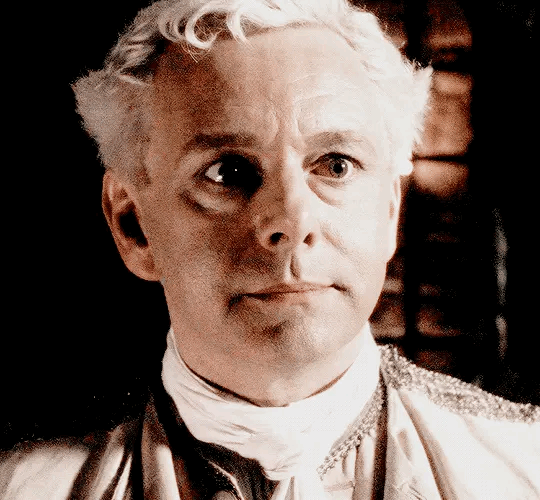
0 notes
Photo

This time - original background characters based in canon! All the characters were mentioned, in the Book or the Show, and got the attention they deserve. As usual, all the fics are rated G or T and are SFW. The description includes rating, word count, main characters and main CW.
Meet Harry by Zeckarin – 806 words, G, focusing on Aziraphale, Harry the Rabbit, Harry Houdini and Bess Houdini. Summary: Throughout history, Aziraphale has made humans friends. Some of them were writers (better not give names, Crowley would get angry). Some others were just as renowned, in a totally different field...
The Redemption of Jean-Claude by Eigon - 903 words, G, focusing on Jean-Claude the Executioner. Summary: What happened to Jean-Claude after he was dragged off to the guillotine?
Chicken Hot Dish by Lunasong365 - 2.3K, rated G, focusing on the police officer and the spokesperson for the nuclear power plant who vowed to become chicken farmers (from the Book). Summary: A life-changing event that Remus can't quite remember is the impetus for him and his brother to quit their jobs and move to what they hope will be a quiet life in the country raising chickens.
I wrote Jesus is My Buddy then got possessed live on television, AMA by doomed_spectacles - 721 words, G, focusing on Crowley, Marvin O. Bagman and Johnny Two Bones. Summary: r/IAmA [Unique Experience] Posted by u/ExBagman 4 hours ago. I am a former televangelist who quit the church and have been roadtripping around the US working on a new country album. I used to host the wildly successful show Marvin’s Hour of Power and sold over 4 million copies of my CD, Jesus is My Buddy. Also I was possessed by a demon last year. AMA!
Love & Faith by @ambrasue - 497 words, G, focusing on Deborah Pulsifer, Newt and Anathema. Summary: Deborah Pulsifer has always had faith in her son.
Four Horsemen Override by @ineffableghost - 176 words, G, focusing on the people who works in power plants and Newt. Summary: In answer to a prayer he was completely unaware of, Newton Pulsifer placed his hands on the keyboard and began to type.
You're Better Off Without Him by voidify - 2K, G, focusing on "You're Better Off Without Him" Passerby, Aziraphale and Crowley. CW - implied suicidal thoughts, References to Alcohol. Summary: For some, it was Judgement Day (or, well, the day that should have been Judgement Day). But for Fred Sherwin, it was just another Saturday. The most memorable thing that personally happened to Fred that day was on his way to the Tube station that morning, when he gave a bit of advice to a white-haired gent who’d just been dumped by some wanker in a vintage car. (The story of that moment, from Fred’s perspective— and the next two times Fred’s path crossed with that same man.)
Worlds end by nyaladin - 707 words, T, focusing on "You're Better Off Without Him" Passerby, Aziraphale and Crowley. Summary: seems like not only Jim is having a bad day today.
How Not to Buy a Book by @lurlur - 661 words, T, focusing on Aziraphale, Gabriel, Sandalphon, costumer. Summary: Outsider POV for the THANK YOU FOR MY PORNOGRAPHY scene
For next week the plan is a bit different, focusing on crack treated seriously (if I’ll have enough stories for that). Please send fics, self recs are encouraged!
Bonus - master list with all past recommendations!
#good omens#good omens fanfiction#weekly spotlight#ngk recs#original characters#harry the rabbit#Jean-Claude the Executioner#marvin o. bagman#johnny two bones#Deborah Pulsifer#aziraphale#crowley#newt#anathema
22 notes
·
View notes
Text
Yes! He loves Earth and humans on the whole and would rather help people succeed than hurt them so he's constantly trying to find loopholes to anything he's tasked to do with Hell. Goes for minimum damage. Damnations likely see him going for people like Jean-Claude, the rapey executioner. Temptations are presenting a choice that, at the core, the person was already at least on a path to considering anyway, and definitely exploiting the subjectivity of the idea of "sin."
He takes credit for evil humans do that he had nothing really to do with and if he has to come up with a project on his own, he passes off irritation and inconvenience as the epitome of evil. These things do have consequences-- knocking out a mobile network even for a short time isn't great-- but it's something that periodically happens anyway and is, comparatively, not as intense a thing as, you know, starting a war or something.
The ironic part is that it's the Discworld but none of the angels and demons really understand yet that people are gods of the Disc and go after they die where they judge themselves to go. Plenty of people believe in Heaven/Hell so they do wind up there but it's all up to them anyway. Demons like Hastur tempting priests into feeling that they had sinned means that it's likely that Hastur helped successfully damn that priest to Hell but only because it's the priest himself that's ultimately damning himself there.

Crowley's fingers making lovely rainy-rain for vavooming by first going up seems to imply to me something that I think is interesting, which is that Crowley makes rain by speeding up an existing water cycle.
He doesn't bring into existence any new water out of nowhere-- Earth has all the water he needs. He doesn't make any rain fall now that wouldn't eventually be falling later. (That also seems a bit metaphorical for other kinds of falling in the story...)
Making rain for Crowley appears to just be rapidly increasing the timetable of the cycle of its formation, beginning with super-fast evaporation of surface water.
I think it's neat that they chose to make it so that this scientist's magic is, essentially, just science. 😊
360 notes
·
View notes
Text
Innocent manga, reaction headcanons
Please, send me asks if you want more reactions.
Meek executioner's daughter is cooking human fat :
So, Madeleine-Claude-Gabrielle is busy in the family's lab after the dissection is ever, clad in simple work clothes, and starts using a sharp kitchen knife to "de-fatten" the corpse. She was sharpening the knife when Jean-Baptiste passed by, having forgotten his scalpel there.
Jean-Baptiste : Oh, I just forgot something here. Continue the good work.
(If anything, she started it probably on his orders)
She had just finished defattening one arm when her "loving" grandmother walked in.
Anne-Marthe : That knife is not sharp enough, you'll gouge your eyes out like this.
After a while, she finished removing most usable body fat, and is about to carry it to the lab. There, she finds her father and Charles-Henri.
Charles-Henri : Claude, if I get this correctly, you melt the human fat and I chop up the plants ?
Falling asleep after domestic CP :
So...Let's just say son, daughter or apprentice.
Anne-Marthe : Okay...So this is one of the few things that I think would soften her up. She would probably think you are adorable and gently kiss goodnight.
Jean-Baptiste : So, he's the one who lulled his boy or girl to sleep after he punished them in the family torture chamber, and would probably just try to get them to wake up to wash, and then carry/escort them safely to sleep. His discpline (more like severe abuse) is bad enough that he would probably expect dizziness, and he'll get the kids to stay in bed. "I hope with this, you will no longer be tempted to misbehave." he'll say as he washed wounds, and then helps the child to reach the bed. I would imagine him being somewhat experienced in noticing the difference between dozing off from sheer exhaustion and actual fainting.
Charles-Henri : Oh, he ends up being a worst father than Jean-Baptiste, and that takes some work. He would probably wake them up, and say in his most gentle tone : "Now, now, no need to be scared. It's all done. How about we get you to sleep somewere were you are not likely to hit your head."
Damien : Probably some more normal parental spanking, especially if he looses patience over his kid acting way too bratty. But, I think having Jacques fall asleep right away would make him scared that he seriously injured or even killed his child. He would NOT be using corporal punishment after that. Especially since, he is after all a single dad in Innocent with no medical formation, so his panic would be understandable.
Soubise : Oh, at first, he'll think the kid either fainted or that he went overboard. He would approach with smelling salts, and he wouldn't have the time to open them before the child awakes. Now, because he doesn't want trouble with his hierchy, he will insist on feeding them, cleaning their wounds and only then would they be allowed to sleep. He won't take kindly to refusals to eat.
3 notes
·
View notes
Note
Hey! I have a question concernin the Bastille scene from episode 3 of Good Omens. I don’t speak French, but when Aziraphale attempts to speak in French to the executioner I can understand parts of it, but not all. When I saw this scene with subtitles, the best I got was something close to “*speaking french poorly*” for Aziraphale. I was wondering if you’ve found a direct translation for their short conversation in French, even though the context tells us what they say anyways lol. Thanks!!
Hiya! :) Here:

(Aziraphale: This is a big mistake. I think that something-)
148 notes
·
View notes